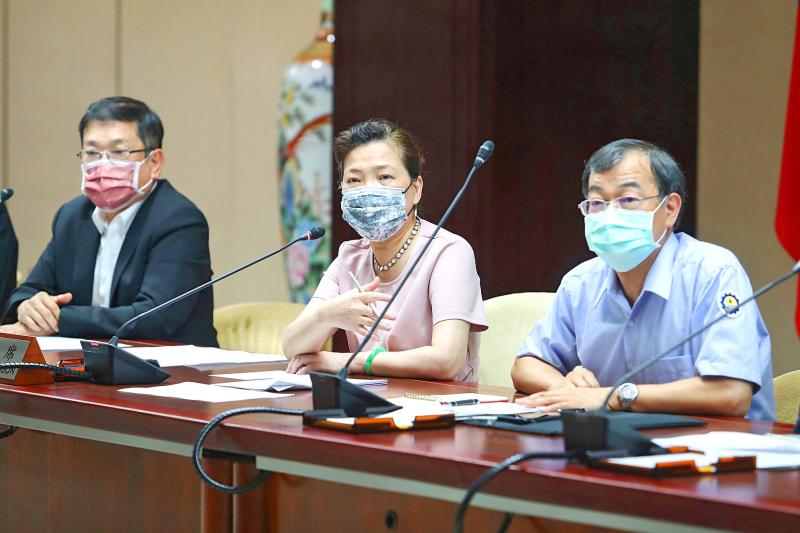Human error was to blame for blackouts across Taiwan on Thursday, Taiwan Power Co (Taipower, 台電) told a news conference yesterday, promising to compensate affected households and businesses.
Taipower vice president Wang Yao-ting (王耀庭) said that the households would be granted a 5 percent discount on their electricity bills for this month and next month, while 6,300 affected high-voltage business users would get a 5 percent discount for this month.
The compensations are expected to cost Taipower about NT$470 million (US$16.78 million), Wang said.

Photo: CNA
The company said that a Taipower employee caused the blackouts by mistakenly turning a switch at an ultra-high-voltage substation in Kaohsiung’s Lujhu District (路竹), leading to a voltage drop that forced the Hsinta Power Plant (興達電廠) to shut down as a protective measure.
About 4.15 million households across Taiwan lost power on a rotational basis, 50 minutes at a time, for about five hours, the utility said.
The Hsinta plant accounted for about 6 percent of Taiwan’s electricity production before it went temporarily offline on Thursday, Taipower said, adding that high temperatures, major generators undergoing maintenance, a water shortage and a lower-than-expected solar energy output also contributed to the incident.
Taipower and the Ministry of Economic Affairs were criticized for the scope of the incident, which came at a time when the system was supposed to have at least 10 percent excess capacity.
The company said that some of its designated reserve capacity was not “dispatchable.”
Asked why it had not activated a hydroelectric power plant at Nantou County’s Sun Moon Lake, Taipower said that Taiwan is in the middle of a historic water shortage.
“Technically, we could have run that plant, but then we would have lost a lot of water,” Taipower spokesman Chang Ting-shu (張廷抒) said.
While a hydroelectric power plant can be activated almost immediately, it takes 15 minutes to fire up a liquefied natural gas power plant and up to six hours for a coal-fired power plants, it said.
The blackouts occured in the afternoon, when solar power output is falling, Taipower said.
Minister of Economic Affairs Wang Mei-hua (王美花) said that Taipower should be “more conservative” in its calculations of reserve capacity, especially during the water shortage.
“We will take grid resilience seriously in the wake of this failure,” Wang said. “We also need more storage for electricity and to ensure our infrastructure projects are completed on schedule.”
A Bureau of Energy report earlier this week showed that Taiwan’s electricity use grew 2.1 percent last year, far above the 10-year average growth of 1.34 percent per year.
The bureau expects an annual average growth rate of 2.5 percent from 2025 to 2031.

CHAOS: Iranians took to the streets playing celebratory music after reports of Khamenei’s death on Saturday, while mourners also gathered in Tehran yesterday Iranian Supreme Leader Ayatollah Ali Khamenei was killed in a major attack on Iran launched by Israel and the US, throwing the future of the Islamic republic into doubt and raising the risk of regional instability. Iranian state television and the state-run IRNA news agency announced the 86-year-old’s death early yesterday. US President Donald Trump said it gave Iranians their “greatest chance” to “take back” their country. The announcements came after a joint US and Israeli aerial bombardment that targeted Iranian military and governmental sites. Trump said the “heavy and pinpoint bombing” would continue through the week or as long

TRUST: The KMT said it respected the US’ timing and considerations, and hoped it would continue to honor its commitments to helping Taiwan bolster its defenses and deterrence US President Donald Trump is delaying a multibillion-dollar arms sale to Taiwan to ensure his visit to Beijing is successful, a New York Times report said. The weapons sales package has stalled in the US Department of State, the report said, citing US officials it did not identify. The White House has told agencies not to push forward ahead of Trump’s meeting with Chinese President Xi Jinping (習近平), it said. The two last month held a phone call to discuss trade and geopolitical flashpoints ahead of the summit. Xi raised the Taiwan issue and urged the US to handle arms sales to

BIG SPENDERS: Foreign investors bought the most Taiwan equities since 2005, signaling confidence that an AI boom would continue to benefit chipmakers Taiwan Semiconductor Manufacturing Co’s (TSMC, 台積電) market capitalization swelled to US$2 trillion for the first time following a 4.25 percent rally in its American depositary receipts (ADR) overnight, putting the world’s biggest contract chipmaker sixth on the list of the world’s biggest companies by market capitalization, just behind Amazon.com Inc. The site CompaniesMarketcap.com ranked TSMC ahead of Saudi Aramco and Meta Platforms Inc. The Taiwanese company’s ADRs on Tuesday surged to US$385.75 on the New York Stock Exchange, as strong demand for artificial intelligence (AI) applications led to chip supply constraints and boost revenue growth to record-breaking levels. Each TSMC ADR represents

State-run CPC Corp, Taiwan (CPC, 台灣中油) yesterday said that it had confirmed on Saturday night with its liquefied natural gas (LNG) and crude oil suppliers that shipments are proceeding as scheduled and that domestic supplies remain unaffected. The CPC yesterday announced the gasoline and diesel prices will rise by NT$0.2 and NT$0.4 per liter, respectively, starting Monday, citing Middle East tensions and blizzards in the eastern United States. CPC also iterated it has been reducing the proportion of crude oil imports from the Middle East and diversifying its supply sources in the past few years in response to geopolitical risks, expanding